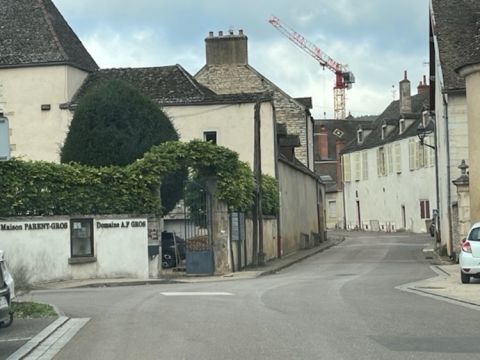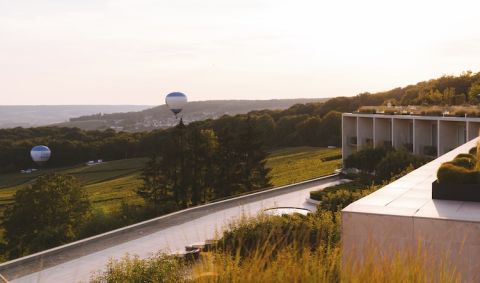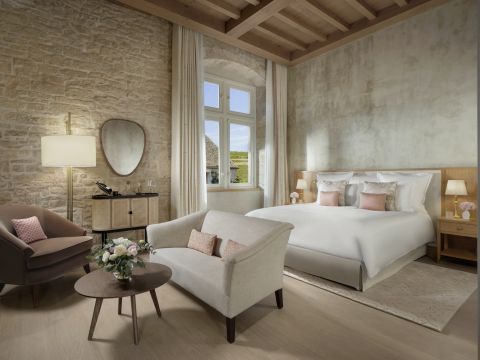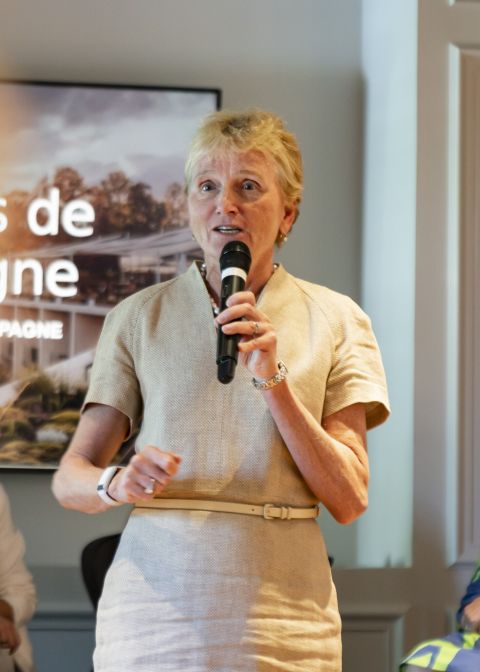Combining wine, tourism and dollars
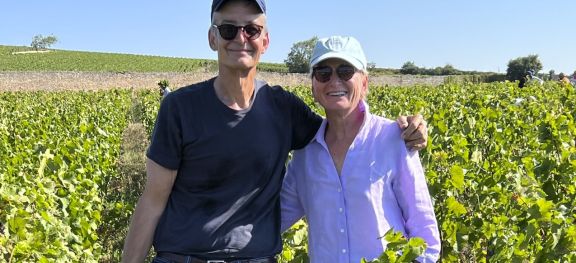
Who has quietly invested in Champagne, Pommard, Rully and a host of luxurious hotels?
Pommard is a famous Burgundian wine village just outside the wine town of Beaune but it’s tiny. When last surveyed, in 2021, the total population was 440.
Imagine how unlikely it is that over the last few years the village has been dominated by giant cranes because not just one but two Americans have each been trying to create a luxury hotel there. Tech entrepreneur Michael Baum bought the Château de Pommard in 2014 and has yet to make that much progress with his planned hotel. But Denise Dupré, who acquired the Château de la Commaraine, based on an eleventh-century castle with later additions, in 2017, is confident of having transformed it into a ‘hotel, spa and cuverie’ by next year.
She will soon have six luxurious hotels on French territory, this one in Burgundy, the well-established Royal Champagne Hotel & Spa plus a boutique hotel in Champagne, one on Paris’s left bank that is currently being renovated, and two on the Caribbean island of St Barts, including Le Barthélemy Hotel & Spa. Her portfolio also, crucially, includes three wine producers, all French, as well as vineyards in the up-and-coming Côte d’Or communes of St-Aubin and Monthelie bought in 2019 and 2022 respectively.
Dupré and her husband Mark Nunnelly, once a managing director at Bain Capital and then senior in the government of Massachusetts, live in Boston and are on more boards than you can shake a stick at, but have been going to Paris, where they have an apartment, for 35 years. They got engaged there and are unabashed Francophiles. France was therefore a natural target for the considerable funds at their disposal. ‘We had this notion that wine and hotels were synergistic. We had no idea it would work as well as it did’, she says now.
Their first acquisition outside the French capital, as recently as 2012, was an unusual champagne house, a pioneer of lunar-dictated biodynamic practices in Champagne. During an online encounter, this dynamic 66 year old told me why Leclerc Briant appealed to them. ‘Pascal Leclerc had been practising biodynamics for years when people thought he was crazy. We anticipated that they would become more and more popular and, inheriting decades of experience, we went out of our way to amplify that approach.’ It’s true that Leclerc Briant champagnes, made by chef de cave and biodynamics devotee Hervé Jestin, have an extra dimension of life about them.
It was while visiting the Champagne region in 2013 that Dupré and Nunnelly had a meal in the Royal Champagne hotel, with its unparalleled position overlooking the second Champagne town Épernay. It was then, as Dupré put it, ‘really under-managed. I went and talked to the manager and asked to see a few rooms. Then the next year it came up for sale and we bought it.’ Simple! Below is the much-expanded version of the hotel plus (some of) the view.
Travel + Leisure magazine has voted the lavishly decorated Royal Champagne Best Resort in France and, with its indoor and outdoor pools, extensive spa, bike tours of the local vineyards and Michelin-starred restaurant, the sedate hostelry I remember has indeed been completely transformed. When I spent one night there in October I noted how unusually user-friendly the bedroom design was.
This is because Dupré has form in the hotel business. She is a career hospitality academic, having taught at Boston University from 1983 to 1995 and then at Harvard until she and her husband founded their own company, Champagne Hospitality, in 2012. She still does some teaching, and fanatically takes pictures for her students of the ‘good, bad and ugly’ in hotels she encounters on her travels.
She reports that now that Champagne Hospitality has established itself as a force, albeit one relatively under the radar (I meet very few people in wine who know anything about it), they attract a steady stream of offers of properties (they own and manage rather than just manage). She mentioned the possibility of opening somewhere in the south of France at some point but I would have thought an alpine property might be more appropriate.
Dupré, still an avid skier though now out-skied by her four children, was brought up, the eldest of nine daughters, in Seven Springs in western Pennsylvania, one of America’s oldest ski resorts and founded by her grandparents, immigrants from Alsace and Germany. Her father, aware that the resort was a little lower than perfection, developed and patented an energy-efficient snow-making system as early as the 1950s. In the 1980s, seeing the need for clean energy, together with his oldest daughter he developed a hydroelectric power plant near the ski area. ‘I’m so lucky to have had these lessons of entrepreneurship that have carried me through my career’, she says. (Also in her early twenties, inspired by her walk to work, she designed and marketed the first women’s attaché case that would hold their shoes.)
Along with ‘exquisite’ – to describe what she’s striving for in her hotels (above is a typical bedroom in the Pommard hotel) – the word ‘entrepreneur’ kept coming up during our conversation, one I treasured, having sought one via various members of her staff since my first visit to Leclerc Briant in 2019. When, three years later, I visited Domaine Belleville in Rully in southern Burgundy, acquired in 2015, I was surprised to run into Paul Krug of the famous Champagne dynasty. He now makes the wine there and at Domaine de la Commaraine in Pommard.
‘What we saw [in Krug]’, said Dupré, ‘was a young entrepreneur who wanted to make his own name and had to leave Champagne to do that. Despite his youth he has so much to offer. Young people have such untutored talent. At my hotels we take in the maximum number of interns we’re allowed to by law. And they’re always the first group I want to talk to when I visit.’
Dupré and Nunnelly have cleverly identified Burgundy’s Mr Fixit. Louis-Michel Liger-Belair of the Domaine du Comte Liger-Belair in Vosne-Romanée is their advisor and has, I was told, taken Krug under his wing.
Surprisingly, despite a surname inherited from her grandfather, Dupré, above, admits she is not fluent enough to conduct a negotiation in French, but insists that they have tried to have French partners and always act ‘incredibly respectfully’ towards French history and customs. Inspired by the concentration of female entrepreneurs such as Veuve Clicquot and Lily Bollinger in Champagne, she has now hosted two get-togethers of women in wine at the Royal Champagne and plans another in Pommard in January 2026.
And the relative appeal of wine and hospitality? Dupré admits that, at least where she and her husband have invested, it’s much easier to make money from grapes than from hotels.
Recommended wines from the Dupré portfolio
Leclerc Briant
Réserve Brut NV Champagne 12%
£50 Berry Bros & Rudd, £50.70 L’Art du Vin
Les Monts Ferrés Brut Zéro Premier Cru 2018 Champagne 12%
£86 Shrine to the Vine, £148 Hedonism, £148 Berry Bros & Rudd
Domaine de la Commaraine
Les Condemennes 2021 Chambolle-Musigny
2022 is £435 per case of 6 in bond (£541.22 duty paid) Justerini & Brooks 13%
Aux Bousselots Premier Cru 2021 Nuits-St-Georges
£574 per case of 6 in bond Cru World Wine, £630 per case of 6 in bond Ideal Wine Co
Clos de la Commaraine Premier Cru 2021 Pommard 13%
£1,045.22 per case of 6 Justerini & Brooks
Tasting notes, scores and suggested drinking dates in our 266,000-strong tasting notes database. For international stockists, see Wine-Searcher.com.
Become a member to view this article and thousands more!
- 15,407 featured articles
- 274,946 wine reviews
- Maps from The World Atlas of Wine, 8th edition (RRP £50)
- The Oxford Companion to Wine, 5th edition (RRP £50)
- Members’ forum
- 15,407 featured articles
- 274,946 wine reviews
- Maps from The World Atlas of Wine, 8th edition (RRP £50)
- The Oxford Companion to Wine, 5th edition (RRP £50)
- Members’ forum
- 48-hour preview of all scheduled articles
- Commercial use of our wine reviews

